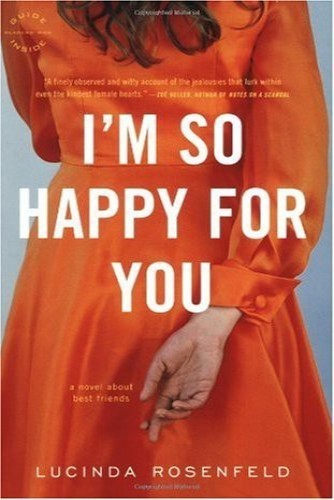
I'm So Happy for You
کتاب های مرتبط
- اطلاعات
- نقد و بررسی
- دیدگاه کاربران
نقد و بررسی

April 13, 2009
Rosenfeld (What She Saw
) delves into the thornier side of female friendship in this hip take on modern womanhood. Wendy and Daphne have been best friends forever, but their relationship, sketched out in e-mails that cascade from their group of girlfriends, comes to a breaking point when Daphne suddenly pulls herself together, stops fooling around with a married man and finds a new love interest who happens to be handsome, rich and obnoxious. In quick succession, Daphne ties the knot, moves into a brownstone and gets pregnant. Meanwhile, Wendy, a low-paid editorial drone who's been trying and failing to conceive with her slacker husband, feels that her own life is thrown into miserable relief. She begins to lash out at Daphne, first passively, and then rather aggressively. In the course of a few twists, misunderstandings and revealed secrets, Wendy questions whether the source of her inferiority complex is Daphne or herself. The two friends are by turns frustrating and sympathetic, while Rosenfeld takes a dark, hilarious and painfully accurate view of the less-than-pure reasons why women stay friends.

June 1, 2009
Rosenfeld (Why She Went Home, 2004, etc.) subversively suggests that best-friendship is as complicated and co-dependent as the average romance.
Wendy is solid, responsible, gainfully employed, attractive and married. Daphne is erratic, emotional, beautiful and spoiled. Since they bonded in college 15 years ago, their relationship has chartered a steady course: Daphne provides the excitement; Wendy is the clean-up crew. But suddenly things have shifted. Daphne has finally left the older, married Mitch (cause of many late-night, suicide-threatening phone calls to Wendy) and clicked with hotshot lawyer Jonathan. This coincides with Wendy's marriage sinking into bored annoyance; fixated on her failure to conceive, she has turned husband Adam into little more than a sperm donor. After their lovely wedding, Jonathan and Daphne find a beautiful Brooklyn brownstone to renovate, just as Wendy and Adam are evicted and have to move into an even dingier apartment than the one they are leaving. Then Daphne gets pregnant, just like that! It's really more than Wendy can bear. Smugly happy with the relationship when her friend was needy, she's ashamed to realize that she doesn't much like the less-dysfunctional Daphne. Her reaction to good fortune reveals to Wendy how petty she is; readers are likely to agree, and her unpleasantness is a problem. Implying that such power plays lie at the heart of female friendships (other peripheral pals are also skewered and roasted), Rosenfeld isn't quite trenchant enough in her observations for the novel to be as unnerving as she intends.
A black comedy that could have been sharper and funnier.
(COPYRIGHT (2009) KIRKUS REVIEWS/NIELSEN BUSINESS MEDIA, INC. ALL RIGHTS RESERVED.)

May 15, 2009
It is often said that jealousy is the great exaggerator.Rosenfelds (Why She WentHome, 2004) latest novelisall about jealousy and the exaggerated lives of a group of New York women. Wendy has the requisite husband andsemi-successful career, and she has always bolstered her self-image by comparing herself to her troubledfriendDaphne. Now, having been her moral support for 15 years, she doesnt know quite how to react when everything in Daphnes usually melodramatic life suddenly becomes perfect. Overcome by jealousy for the wealth, success, real estate, marriage, and pregnancy of her formerly suicidal friend, Wendys own behavior takes a turn for the worse. While the actions of nearly every character in the book are morally questionable, their emotions are real and often funny. With portions of the story told through e-mail exchanges, Rosenfeld demonstrates Wendys dysfunctional relationships with her friends and family, and addresses the ugliness ofenvy with both humor and honesty.(Reprinted with permission of Booklist, copyright 2009, American Library Association.)

























دیدگاه کاربران